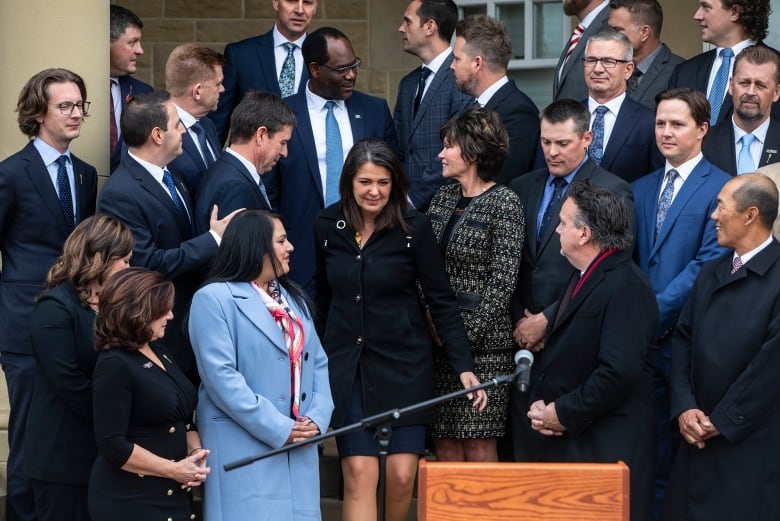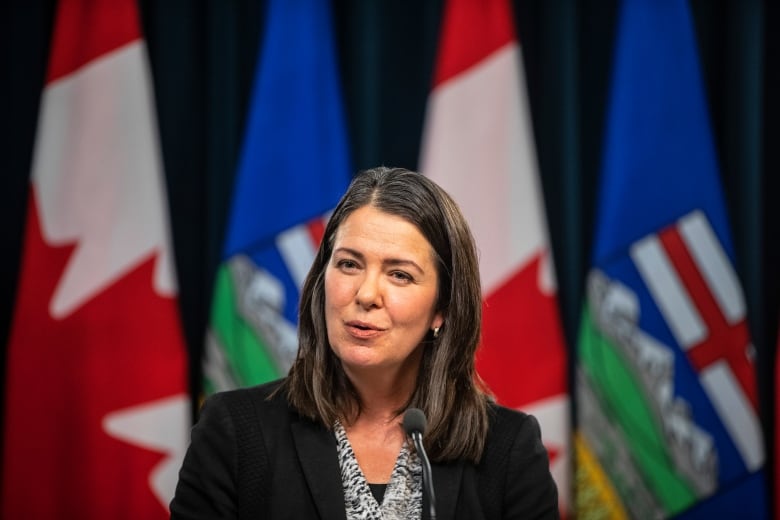
This column is an opinion from Feo Snagovsky, an assistant professor of political science at the University of Alberta. For more information about CBC’s Opinion section, please see the FAQ.
Some observers were relieved, while others were disappointed, as Alberta’s lieutenant-governor gave royal assent to the Alberta Sovereignty Within a United Canada Act last week.
Since the government has yet to invoke the act and the courts have yet to weigh in on its constitutionality, we’ve reached what we might think of as the mid-season finale of the Sovereignty Act saga.
It is a good time to stop and reflect on how we got here, and what it means for democracy and the rule of law in Canada.
The case for why the Sovereignty Act is unconstitutional and undemocratic has now been widely made, but in short, it shouldn’t be (and isn’t, according to any reasonable reading of our constitutional framework) up to politicians to judge the outcome of jurisdictional disputes or ignore the rule of law.
By passing this law, the Alberta government sets itself up as the judge, jury and executioner of federalism — a fundamental threat to how democracy works in Canada.
So, how did we get here?

In September of 2021, then-Alberta premier Jason Kenney was in trouble.
After the premier narrowly dodged a non-confidence motion from within his own caucus, his MLAs were pointedly asked what would actually happen if they got him to resign.
Apparently, “nobody had a good answer for that one.”
Their bluff had been called, and since Kenney had agreed to the leadership review that would ultimately be his downfall, this brief scene of palace intrigue was quickly forgotten.
About a week later, a group of prominent conservatives released what they called the “Free Alberta Strategy,” a series of proposals that would see the creation of an Alberta provincial police force, an Alberta provincial pension plan, an end to equalization, and critically, an Alberta Sovereignty Act that would let Alberta refuse to enforce federal legislation or judicial decisions that ran contrary to “the interests of Alberta’s People.”
The timing was probably not a coincidence.
From a strategic perspective, the authors may have sensed the premier was vulnerable from his right flank after his handling of the COVID-19 pandemic — and so, they had an opportunity to strike.
However, it seems pretty clear that the authors did not expect Kenney to adopt the strategy wholesale, since he later called the ideas behind it “catastrophically stupid,” and a “full-frontal attack on the rule of law” that would turn Alberta into a “banana republic.”
They likely expected someone to call their bluff, too, and if that meant only a few of the less radical proposals would be considered, that would still be a win.
Indeed, Kenney was already enthusiastic about a provincial police force, for example, and was happy to continue talking about that.
It’s easy to make outlandish suggestions when you know someone is going to stand up to you.
In fact, doing so could help to eventually move the Overton window — the range of politically acceptable policy positions — and serve as a virtue signal to one’s own in-group.
The point of the latter is to accumulate what social psychologists refer to as intra-group prestige — an increase in social status associated with skill and respect.
In this case, the most extreme proposals signal an ideological commitment to a west “free” from federal intrusion, however unworkable the proposals themselves are.
Take Saskatchewan’s own proposals as another example.
Government ministers in that province have taken pains to emphasize their own Saskatchewan First Act is more than symbolic, even as legal experts argued it wouldn’t meaningfully change any of the province’s jurisdictional capabilities.
Indeed, they were defending against the exact charge of virtue signalling from the provincial NDP with regard to their own proposal to create a Saskatchewan Revenue Agency.

For both the UCP and the Saskatchewan Party, appearing to be “tough” on the federal government is the political equivalent of apple pie, a tried-and-true message that even their political opponents have leveraged from time to time.
Virtue signalling like this is fine when the stakes are low — say, over drinks with friends.
However, the consequences are necessarily greater when these signals concern public policy.
Even if such proposals go nowhere, previously ridiculous positions may be considered more sensible. They also pave the way for future bargaining positions that are even more extreme.
It is no longer clear whether the Alberta Sovereignty Act is a virtue signal that has now gone horribly wrong, or whether Premier Danielle Smith really and truly believes it when she says, “Ottawa is not a national government. The way our country works is that we are a federation of sovereign, independent jurisdictions. They are one of those signatories to the Constitution and the rest of us, as signatories to the Constitution, have a right to exercise our sovereign powers in our own areas of jurisdiction.”
To be clear, that is absolutely not how our country works (which Smith knew at least to some extent last Friday, when she joined other premiers in asking Ottawa for more money).
Our democratic system requires everyone to agree to a common set of rules, and to abide by them.
Instead, the premier is playing a game of political chicken by setting us up for a constitutional crisis — indeed, that was the strategy’s whole point (see page 35).
We’re not quite there yet — but we’re close.
So, what’s next?
The lieutenant-governor was right to give royal assent to the Alberta Sovereignty Act, as withholding it would have triggered the very constitutional crisis that Smith appears to want.
The federal government’s disallowance power would have the same effect, and should not be used.
Ultimately, it will be up to the courts to decide whether the act will stand or not.
In the meantime, however, Albertans have the option to let their MLAs know that they don’t support the act being used to ignore the rule of law.
After all, most of them don’t want to live in a banana republic.
Do you have a strong opinion that could add insight, illuminate an issue in the news, or change how people think about an issue? We want to hear from you. Here’s how to pitch to us.